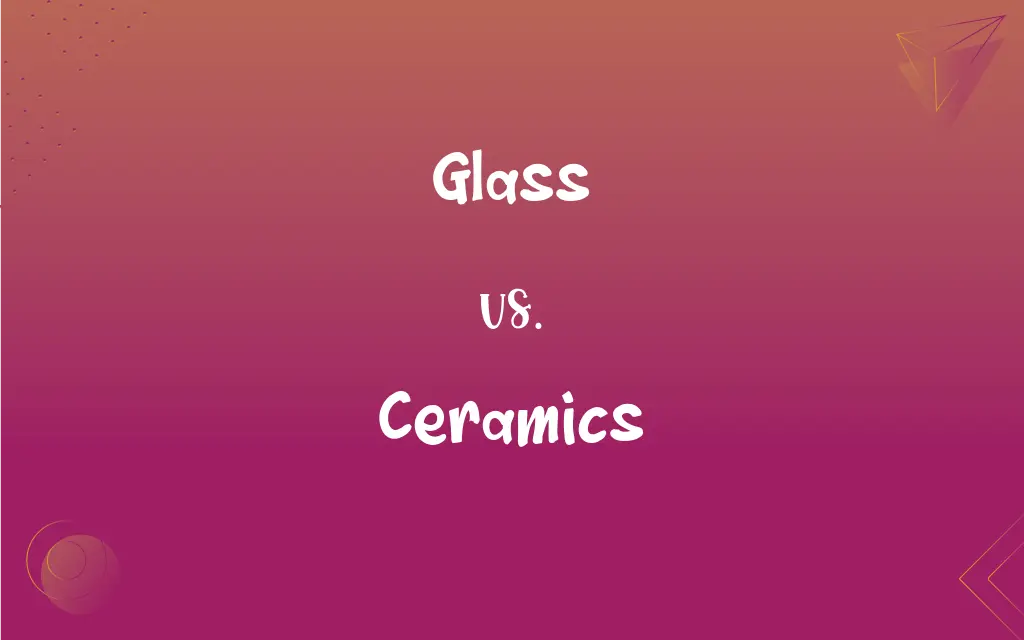Glass vs. Ceramics: What's the Difference?
Edited by Harlon Moss || By Janet White || Updated on November 13, 2023
Glass is transparent, typically brittle material made by fusing sand with soda and lime. Ceramics refers to non-metallic, inorganic materials, which can be crystalline, partly crystalline, or amorphous.

Key Differences
Glass and ceramics are widely utilized materials, each possessing distinct attributes and applications. Glass, known for its transparency and visual clarity, is omnipresent in windows, containers, and various other items. Contrarily, ceramics, recognized for their heat and electrical insulating properties, find extensive use in industries like construction and aeronautics.
Diving into their compositions, glass primarily emanates from silica, undergoing melting and subsequent rapid cooling to prevent crystalline structure formation. It is this absence of crystals that grants glass its characteristic transparency. On the other hand, ceramics typically originate from clay but can also be synthesized from various materials, often entailing heating processes that promote crystallinity, rendering ceramics typically opaque.
In the realm of durability and strength, glass and ceramics diverge notably. Glass, while hardened in certain applications, generally remains brittle and shatters under stress, fragmenting into sharp pieces. Contrastingly, ceramics embody higher robustness and can exhibit both brittle and ductile characteristics, contingent on their specific make-up, enabling broader applications in varied stress environments.
Consider thermal and electrical conductivities, glass tends to be a good insulator but can be altered to conduct electricity in specific applications like conductive glass. Ceramics are renowned for their insulating prowess, both thermally and electrically, and are employed in various industrial applications for these exact properties.
In an aesthetic context, the alluring transparency of glass renders it a favorite in decor and utility items like bottles, vases, and tabletops, offering a sleek, modern appearance. Conversely, ceramics carry a more earthy, warm aesthetic, and their versatility in form and finish makes them popular in decor, utilitarian items, and architectural applications.
ADVERTISEMENT
Comparison Chart
Basic Definition
A transparent or translucent, hard material.
Materials made by heating and cooling clay or other minerals.
Physical State
Typically amorphous (non-crystalline).
May be crystalline, semi-crystalline, or amorphous.
Transparency
Transparent to translucent.
Typically opaque.
Thermal Conductivity
Generally low, used as an insulator in windows.
Typically low but can be adjusted (like in space shuttle tiles).
Usability
Commonly used in windows, containers, etc.
Used in pottery, tiles, utensils, etc.
ADVERTISEMENT
Glass and Ceramics Definitions
Glass
A hard, transparent material made by melting sand with soda and lime.
The vase made of glass shattered when it hit the floor.
Ceramics
The branch of technology dealing with the production and use of ceramic materials.
She pursued a degree in ceramics to develop new types of porcelain.
Glass
The liquid capacity of a glass container.
He drank a glass of orange juice for breakfast.
Ceramics
Hard, brittle, heat-resistant, and non-conductive materials made by shaping and firing a non-metallic mineral, like clay.
The electrical insulator made from ceramics is highly durable.
Glass
A lens or a set of lenses in a frame, used to aid vision or protect the eyes.
Her glass lenses helped her see better in the distance.
Ceramics
Objects made from clay or similar materials, fired in a kiln.
The museum had an exquisite collection of ancient ceramics.
Glass
Any of a large class of materials with highly variable mechanical and optical properties that solidify from the molten state without crystallization, are typically made by silicates fusing with boric oxide, aluminum oxide, or phosphorus pentoxide, are generally hard, brittle, and transparent or translucent, and are considered to be supercooled liquids rather than true solids.
Ceramics
The art or process of making objects from clay.
The pottery class introduced him to the world of ceramics.
Glass
A drinking vessel.
Ceramics
Any of various hard, brittle, heat-resistant and corrosion-resistant materials made by shaping and then firing a nonmetallic mineral, such as clay, at a high temperature.
Glass
A mirror.
Ceramics
An object, such as earthenware, porcelain, or tile, made of ceramic.
Glass
A barometer.
Ceramics
Ceramics (used with a sing. verb) The art or technique of making objects of ceramic, especially from fired clay.
Glass
A window or windowpane.
Ceramics
Plural of ceramic
Glass
The series of transparent plastic sheets that are secured vertically above the boards in many ice rinks.
Ceramics
The art or science of making ceramic objects.
Glass
Glasses A pair of lenses mounted in a light frame, used to correct faulty vision or protect the eyes.
Ceramics
Ceramic objects as a group.
Glass
Often glasses A binocular or field glass.
Ceramics
The art of making things of baked clay; as pottery, tiles, etc.
Glass
A device, such as a monocle or spyglass, containing a lens or lenses and used as an aid to vision.
Ceramics
Work formed of clay in whole or in part, and baked; as, vases, urns, etc.
Glass
The quantity contained by a drinking vessel; a glassful.
Ceramics
The art of making and decorating pottery
Glass
Objects made of glass; glassware.
Ceramics
Pottery, porcelain, and brick, considered as a group.
The local market had a wide variety of ceramics on display.
Glass
Made or consisting of glass.
Glass
Fitted with panes of glass; glazed.
Glass
To enclose or encase with glass.
Glass
To put into a glass container.
Glass
To provide with glass or glass parts.
Glass
To make glassy; glaze.
Glass
To see reflected, as in a mirror.
Glass
To reflect.
Glass
To scan (a tract of land or forest, for example) with an optical instrument.
Glass
To become glassy.
Glass
To use an optical instrument, as in looking for game.
Glass
An amorphous solid, often transparent substance, usually made by melting silica sand with various additives (for most purposes, a mixture of soda, potash and lime is added).
The tabletop is made of glass.
A popular myth is that window glass is actually an extremely viscous liquid.
Glass
Any amorphous solid (one without a regular crystal lattice).
Metal glasses, unlike those based on silica, are electrically conductive, which can be either an advantage or a disadvantage, depending on the application.
Glass
(countable) A vessel from which one drinks, especially one made of glass, plastic, or similar translucent or semi-translucent material.
Fill my glass with milk, please.
Glass
(metonymically) The quantity of liquid contained in such a vessel.
There is half a glass of milk in each pound of chocolate we produce.
Glass
(uncountable) Glassware.
We collected art glass.
Glass
A mirror.
She adjusted her lipstick in the glass.
Glass
A magnifying glass or telescope.
Glass
(sport) A barrier made of solid, transparent material.
Glass
The backboard.
He caught the rebound off the glass.
Glass
(ice hockey) The clear, protective screen surrounding a hockey rink.
He fired the outlet pass off the glass.
Glass
A barometer.
Glass
Transparent or translucent.
Glass frog;
Glass shrimp;
Glass worm
Glass
(obsolete) An hourglass.
Glass
Lenses, considered collectively.
Her new camera was incompatible with her old one, so she needed to buy new glass.
Glass
A pane of glass; a window (especially of a coach or similar vehicle).
Glass
(transitive) To fit with glass; to glaze.
Glass
(transitive) To enclose in glass.
Glass
(transitive) fibreglass To fit, cover, fill, or build, with fibreglass-reinforced resin composite (fiberglass).
Glass
To strike (someone), particularly in the face, with a drinking glass with the intent of causing injury.
Glass
To bombard an area with such intensity (nuclear bomb, fusion bomb, etc) as to melt the landscape into glass.
Glass
(transitive) To view through an optical instrument such as binoculars.
Glass
(transitive) To smooth or polish (leather, etc.), by rubbing it with a glass burnisher.
Glass
To reflect; to mirror.
Glass
(transitive) To make glassy.
Glass
(intransitive) To become glassy.
Glass
A hard, brittle, translucent, and commonly transparent substance, white or colored, having a conchoidal fracture, and made by fusing together sand or silica with lime, potash, soda, or lead oxide. It is used for window panes and mirrors, for articles of table and culinary use, for lenses, and various articles of ornament.
Glass
Any substance having a peculiar glassy appearance, and a conchoidal fracture, and usually produced by fusion.
Glass
Anything made of glass.
She would not liveThe running of one glass.
Glass
A drinking vessel; a tumbler; a goblet; hence, the contents of such a vessel; especially; spirituous liquors; as, he took a glass at dinner.
Glass coaches are [allowed in English parks from which ordinary hacks are excluded], meaning by this term, which is never used in America, hired carriages that do not go on stands.
Glass
To reflect, as in a mirror; to mirror; - used reflexively.
Happy to glass themselves in such a mirror.
Where the Almighty's form glasses itself in tempests.
Glass
To case in glass.
Glass
To cover or furnish with glass; to glaze.
Glass
To smooth or polish anything, as leater, by rubbing it with a glass burnisher.
Glass
A brittle transparent solid with irregular atomic structure
Glass
A glass container for holding liquids while drinking
Glass
The quantity a glass will hold
Glass
A small refracting telescope
Glass
Amphetamine used in the form of a crystalline hydrochloride; used as a stimulant to the nervous system and as an appetite suppressant
Glass
A mirror; usually a ladies' dressing mirror
Glass
Glassware collectively;
She collected old glass
Glass
Furnish with glass;
Glass the windows
Glass
Scan (game in the forest) with binoculars
Glass
Enclose with glass;
Glass in a porch
Glass
Put in a glass container
Glass
Become glassy or take on a glass-like appearance;
Her eyes glaze over when she is bored
Glass
A container made from glass material, often used for drinking.
She poured herself some water in a glass.
Glass
A smooth surface, resembling glass, especially in terms of reflectiveness.
The lake was calm and clear, like a mirror of glass.
FAQs
What is the basic definition of glass?
Glass is a hard, typically transparent material made by heating sand with soda and lime.
Is glass recyclable?
Absolutely, glass is 100% recyclable and can be recycled endlessly without loss of quality.
Can glass act as an insulator?
Yes, glass is a poor conductor of electricity and heat, acting as an insulator.
Are glass items brittle?
Yes, glass tends to be brittle and can break easily upon impact.
Is glass production energy-intensive?
Generally, yes. Producing glass from raw materials requires a lot of energy.
What are common uses of glass?
Glass is widely used in windows, containers, eyewear, and many other applications.
Can glass be naturally occurring?
Yes, obsidian is a naturally occurring volcanic glass.
Is all glass transparent?
No, glass can be transparent, translucent, or opaque, depending on its composition and production process.
Can ceramics withstand high temperatures?
Yes, many ceramics can withstand very high temperatures and are used in high-temperature applications.
Can glass be molded into shapes?
Yes, molten glass can be molded into various shapes and forms.
Can ceramics be transparent?
Some ceramics, like certain types of porcelain, can be made to be translucent, but most are opaque.
Are ceramics recyclable?
Ceramics are not commonly recycled in a conventional manner, largely due to their durability and lifespan.
What are ceramics used for in technology?
In technology, ceramics are used in components like insulators, capacitors, and even in biomedical implants.
How are ceramics defined?
Ceramics are non-metallic, inorganic materials that are typically made by heating and cooling clay.
What are some examples of ceramics?
Examples include pottery, tiles, bricks, and porcelain.
Are ceramics biodegradable?
No, ceramics do not biodegrade, though they can break down physically over time.
Is porcelain a type of ceramic?
Yes, porcelain is a type of ceramic characterized by fineness and often translucency.
Can ceramics be painted?
Yes, ceramics can be painted and glazed to add decorative features and enhance durability.
What alters the color of glass?
Adding different metal oxides during production can change the color of glass.
Are ceramics good insulators?
Yes, ceramics generally have low thermal and electrical conductivity, making them good insulators.
About Author
Written by
Janet WhiteJanet White has been an esteemed writer and blogger for Difference Wiki. Holding a Master's degree in Science and Medical Journalism from the prestigious Boston University, she has consistently demonstrated her expertise and passion for her field. When she's not immersed in her work, Janet relishes her time exercising, delving into a good book, and cherishing moments with friends and family.
Edited by
Harlon MossHarlon is a seasoned quality moderator and accomplished content writer for Difference Wiki. An alumnus of the prestigious University of California, he earned his degree in Computer Science. Leveraging his academic background, Harlon brings a meticulous and informed perspective to his work, ensuring content accuracy and excellence.






































































